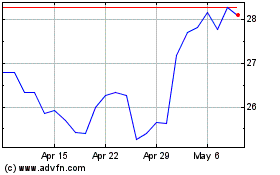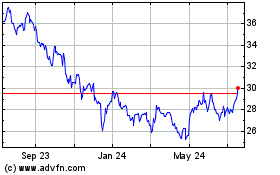By Jared S. Hopkins and Chris Wack
The U.S. has agreed to pay Pfizer Inc. and BioNTech SE nearly $2
billion to secure 100 million doses of their experimental Covid-19
vaccine to provide to Americans free of charge, the latest sign the
government is readying plans to make vaccines available if proved
to work safely.
Under the $1.95 billion agreement, the U.S. Department of Health
and Human Services and the Defense Department will receive 100
million doses of the vaccine should it be cleared by regulators,
and can also acquire an additional 500 million doses. The vaccine,
which has shown promising preliminary results in small groups of
patients, is set to enter late-stage testing this month.
No Covid-19 vaccine in development has proven to work safely
yet, although dozens are being studied. The U.S. and other
governments are spending billions of dollars to secure potential
Covid-19 vaccines and treatments should they prove safe and
effective. The race has countries scrambling as they try to secure
enough vaccines and the supplies to transport them.
As part of its Operation Warp Speed program, the U.S. has
already struck agreements with other vaccine developers to secure
doses, including a $1.2 billion deal with AstraZeneca PLC for at
least 300 million doses of a vaccine developed by University of
Oxford researchers. A $1.6 billion agreement with Novavax Inc. will
fund clinical studies of its experimental vaccine and establish
large-scale manufacturing of doses.
The agreement with Pfizer and BioNTech is the largest from the
U.S. so far to secure Covid-19 vaccine supplies. It won't fund any
research and development, according to the companies, unlike other
deals that helped pay for testing and the scale-up of manufacturing
capacity.
"We're bringing all the resources to bear that we possibly can
to try and be a part of a solution to what is a global pandemic,"
Pfizer Chief Business Officer John Young said in an interview. "The
world is going to need a lot of vaccines."
Researchers expect final-stage studies of the most advanced
experimental Covid-19 shots, including those from AstraZeneca,
Moderna Inc. and Pfizer, will enter late-stage testing in the U.S.
in the coming weeks with the possibility of being available later
this year.
The rapid timetable opens the door for health regulators to
permit use as early as the fall, if the shots prove to work safely
in their phase 3 trials. The U.S. Food and Drug Administration has
the authority to quickly authorize drugs and vaccines on an
emergency basis. In May, the agency did so for the antiviral
remdesivir from Gilead Sciences Inc. for hospitalized Covid-19
patients days after positive results.
How any potential Covid-19 vaccine is distributed in the U.S.
remains to be worked out. Public-health experts suspect they will
go initially to frontline health-care workers and responders, and
possibly to essential workers like grocery, pharmacy, food-supply
and mass-transit employees.
One possibility for distributing the vaccine is through the
apparatus used to provide seasonal flu vaccines to children,
public-health experts and analysts say.
The U.S. piggybacked on the children's vaccination program to
send shots for the H1N1 virus to hospitals and doctors' offices
during the avian-flu pandemic in 2009, said Phyllis Arthur, vice
president for infectious diseases and diagnostics policy at the
Biotechnology Innovation Organization trade group. The program
could provide the basis for distributing a coronavirus vaccine, but
it might need to be adjusted to ensure the vaccine reaches
high-risk populations, including ethnic or racial minorities, Ms.
Arthur added.
Pfizer plans to spend at least $1 billion on its Covid-19
vaccine program this year, Mr. Young said. To simplify delivery of
its vaccines, Pfizer is making the shots at three U.S. plans, while
relying on separate ones overseas for Europe, he said.
While the vaccines might be provided to Americans free of
charge, New York-based Pfizer and Germany's BioNTech didn't specify
pricing details. Analysts estimated the vaccine's price at $19.50
per dose, or $39 for two doses, based on the announcement. The
price is in line with what the private sector pays for flu
shots.
"These are extraordinary times, and our pricing will reflect
that. And during the term of the pandemic we'll price our potential
vaccine consistent with what we recognize as an urgent global
health emergency," Mr. Young said.
The Pfizer and BioNTech vaccine is set to enter a late-stage,
30,000-person study this month. If the testing is successful and
the vaccine is proven to work safely, Pfizer and BioNTech said they
expect to seek emergency use authorization or some form of
regulatory approval as early as October.
Earlier this week, the two companies released additional
positive early-stage results of a trial in Germany, which supported
results from a corresponding U.S. trial. The companies are studying
at least four vaccine candidates.
The companies expect to manufacture globally up to 100 million
doses by the end of 2020 and potentially more than 1.3 billion
doses by the end of 2021, subject to final dose selection from
their clinical trial.
The Pfizer-BioNTech vaccine uses an innovative gene-based
technology known as messenger RNA. Messenger RNA, or mRNA, carries
instructions from DNA to the body's cells to make certain proteins.
An mRNA vaccine has never been approved to prevent any infectious
disease.
Aside from AstraZeneca and Novavax, other companies getting U.S.
funding for coronavirus drug and vaccine programs are Moderna Inc.,
Johnson & Johnson and Regeneron Pharmaceuticals Inc.
Vaccines typically take years to develop and prove they work
safely, and many fail during the process. For Covid-19,
manufacturers and researchers have said advances in vaccine
technology, aided by government and private investments, have
helped shorten the development timeline.
Covid-19 vaccine developers are also combining phases of studies
and studying their vaccines at the same time they are ramping up
manufacturing capabilities, industry and health officials say.
"This is unprecedented, and that is the only way you can really
move at this kind of speed -- is to do so many stages over your
development and manufacturing process in parallel, rather than
doing them sequentially," Mr. Young said.
Write to Jared S. Hopkins at jared.hopkins@wsj.com
(END) Dow Jones Newswires
July 22, 2020 15:45 ET (19:45 GMT)
Copyright (c) 2020 Dow Jones & Company, Inc.
Pfizer (NYSE:PFE)
Historical Stock Chart
From Mar 2024 to Apr 2024

Pfizer (NYSE:PFE)
Historical Stock Chart
From Apr 2023 to Apr 2024
